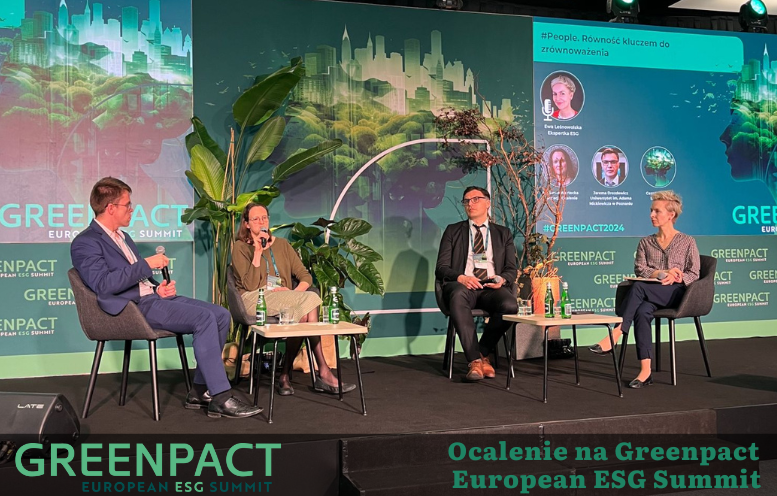On October 29 and 30, a representation of the Ocalenie Foundation actively participated in the Greenpact congress in Poznan. Our representatives participated in four panel discussions, ensuring the presence at the event of the voice of organizations supporting people with migration and refugee experience.
Marianna Wartecka, Director of Partnerships and Advocacy, during the panel “Alliance of business and NGOs – fiction or real action?” spoke, among other things, about what is important for us in such cooperation: “In NGO-business relations we rely on partnerships. There is expert knowledge in the organizations, we can facilitate sustainable development goals, we don’t want to be just an ‘order on the chest’, we want companies that share our goals and values to enter into cooperation. It’s important to have an agreement so that we come together in what we want to do together.”
Tomasz Pietrzak, a lawyer, took part in a panel on migration strategy, “Non policy. Which migration strategy for Poland?” Tomasz said this about the government’s new strategy:
“Migration is a certain phenomenon, a social phenomenon that cannot be completely controlled. It is possible to adapt to it, taking into account three factors, in order of priority:
1. the obligations binding Poland under international law, European law and the Constitution regarding human rights;
2. the mutual perception of migration as a benefit, both for the host society and for migrants, particularly in the context of access to the labor market;
3. the context of security and the state’s right to decide on access to the territory.
The strategy that the government has put forward does not work in this scheme, it places the priority only in the third step. It does not view migration in the context of mutual benefit. When those focused only on the third step plan the strategy, it becomes disjointed, not holistic. The strategy presented by the government accurately diagnoses some problems but is not comprehensive, it does not focus on the whole issue of migration and what it entails.”
Kristina Stankiewicz, manager of the career counseling team, participated in a panel on forced labor. She said: “We envision some factories outside big cities, inaccessible places, and forced labor is also done by people we deal with every day. We order packages, we order food – we don’t know if the people working in such companies are not victims of human trafficking or forced labor.
For example, there may be cases of signing contracts with a salary of PLN 8/hour, no employment contract, unclear scopes of duties, or grueling physical labor. What’s more, it’s not just companies operating in loopholes but also educational institutions or hotels.
The concept of forced labor needs to be further defined. Clarifying this definition is necessary because often cases of forced labor occur in our immediate environment.
Companies can be great employers but using, for example, employment agencies, they do not have direct access to how the people working for them are treated. It would be worthwhile for us to talk about the phenomenon of forced labor in a wider circle, not just NGOs, but to include business in the discussion as well.”
In the panel #People. Equality the Key to Sustainability, Marianna Wartecka mentioned the principles that guide the Foundation in taking care of equality within the organization: “At the Foundation, when introducing various procedures or recommendations, such as the inclusive language guide or the procedure for preventing inappropriate behavior, we don’t stop at just paperwork. We try to invest in the team through workshops, trainings, meetings, and we want our staff to have a chance to understand the values and goals behind the document. I recommend that we act similarly in business as well – it’s just more effective.”
Greenpact was an excellent opportunity to share our organization’s perspective in a broader forum of people who influence the formulation of internal or local government policies related to social inclusion in the broader sense. The opportunity to share our experience was very valuable to us.
The participation of representatives of the Ocalenie Foundation in the Greenpact Congress is financed by funds from the National Freedom Institute, from the 2018-2030 PROO Civic Organizations Development Program – Priority 5 Ad-Hoc Support












